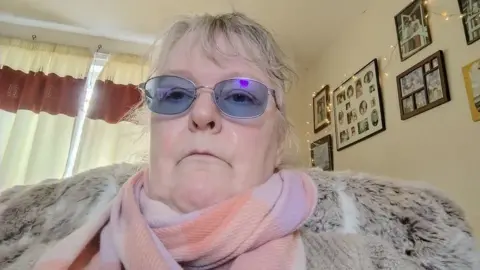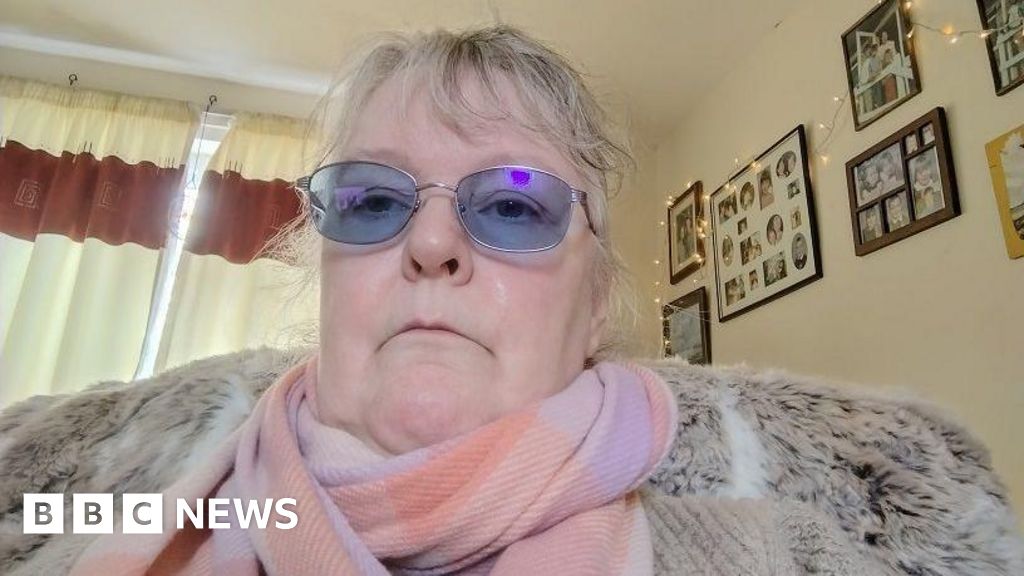Business reporters, BBC News
 Alison
AlisonThe government is set to announce cuts to spending on welfare this week, after the prime minister called the current system “unsustainable, indefensible and unfair”.
The axe is expected to come down heavily on long-term sickness and disability benefits, especially Personal Independence Payment (PIP), which may see a £5bn cut.
An increase in the number of people claiming long-term, health-related benefits has pushed the total welfare bill to £64bn a year. Some argue that reforming the system would encourage claimants to work, or work more.
But this has left many people afraid they won’t be able to afford to pay their bills or worried they will have to take jobs they cannot manage.
The BBC spoke to several people concerned how the cuts might affect them.
Alison, 56, who lives with her brother in a council property in Southampton, says she feels “sick” at the prospect of cuts.
She has been diagnosed with depression, anxiety and PTSD brought on by childhood traumas. She also suffers panic attacks and night terrors. Since Covid she is afraid of leaving the house due to “fear of germs”.
Alison hasn’t worked since she lost her job with Southampton City Council in 1997, and claims both PIP, the main disability benefit, and Employment and Support Allowance (ESA) totalling around £1,700 per month.
She says she would find it difficult to cope with the pressure of a job.
“It’s not a case of not wanting to [work],” she says. “I think about it all the time.
“Being on benefits doesn’t make me feel happy.”
Alison has been told her benefit entitlement will last until 2027, but she says the prospect of it being cut after that is “extremely upsetting”.
 Emily
EmilyEmily, 41, lives in Croydon, is autistic and struggles with time management and organising basic tasks for her daily routine.
“My autism has prevented me from getting jobs in the past,” she says.
“Sometimes in interviews I wasn’t able to answer any of the questions.
“I was umming and ahhing a lot, repeating myself. When you do that, people think ‘this person is strange. We don’t want this person’.”
She is now working full time as a flight attendant and has developed strategies to help with being late, including getting up much earlier to allow extra time before shifts.
She is aware of the criticism benefit claimants often receive. “I’m not a scrounger,” she says.
Emily gets more than £400 per month in PIP payments, which are not dependent on the recipient’s income. But the money mostly goes on her regular bills, rather than on the occupational therapy she thinks would really help her to establish a proper routine.
Receiving PIP also means she is eligible for a disabled discount railcard, which makes travel to work more affordable.
“It’s a big thing,” she says. “I would struggle to pay.”
Justine, 42, was born with a painful genetic condition affecting her joints.
Even movements as minor as chopping vegetables or sneezing can result in a dislocation. She has also developed dysautonomia, a condition affecting her nervous system, that can cause her to faint.
The constant pain, and other symptoms, cause fatigue, but she manages to work 14 hours a week tutoring, supporting students with special educational needs.
“For a year I couldn’t work at all. Then I started to get more on top of things. I got a diagnosis and medication and started to feel a bit better.
“But as far as most of my doctors are concerned, they’re very surprised I work at all.”
Without the £737 financial support each month, which helps pay for help in the house and transport, she says she wouldn’t be able to work.
“It would be counterproductive, it wouldn’t save them money,” she says, because her other benefits would rise if she lost her earnings.
 Steve
SteveSteve from South London had to stop working after a car accident left him with chronic cervical spondylosis, which affects the health of bones and skin on the neck, and brain damage.
He misses working but says taking away his benefits wouldn’t mean he was able to take up a job.
“In my situation, I get a lot of ignorant comments… Why don’t I jump on a moped on Uber Eats? Everything you do normally…it hurts. If I stand up too long it hurts,” he says.
“What am I supposed to do? Float?”.
Steve receives universal credit, as well as incapacity benefits including PIP, but says it is hard to meet his energy bills and pay for food with the income he is on.
“My life is already at below minimal quality – that will reduce further and health will suffer first,” he says.
Encouraging people on benefits to go back to work can feel like bullying, he says.
“When the government say ‘encourage’, the reality is ‘threaten’,” he says. “You’re being threatened back to work.”
 Alba
AlbaAlba, 53, is an IT contractor in Dorking who is currently working for one of the airports near London. While she suffers chronic back pain following two “quite severe” motorbike accidents, she doesn’t currently receive any disability support.
During a period of unemployment last year, when she was eating into her savings to get by, she applied. But in March she was told that she was not eligible.
“They did their best to assess me – they were fair – and the conclusion is that I can do some work.
“That is true – but I wanted them to recognise I am in chronic pain,” she says.
She is concerned that if her current contract is not renewed she may find it difficult to find a job that allows her to work from home.
“I’m not able to go to work every day in an office. I’m literally not,” she says.
Her current employer has been “extremely helpful” in letting her work from home, a subject she has spoken to the BBC about before.
“I’m really glad I found this job,” she says.
“I don’t want to claim benefits – it’s horrible. It’s not my style,” she adds. “I don’t want to stay at home doing nothing.”


